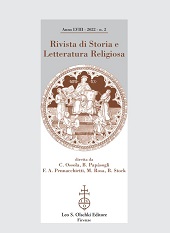2022 - Leo S. Olschki
Artículo
Digital Version
Download | Copia/pega | NO Impresión
Una riflessione ortodossa russa sulle tre Rome agli inizi del terzo millennio : il testo della monaca Elisaveta (1956-2010), igumena del monastero che fu di Filofej di Pskov
P. 155-188
- The fall of Constantinople (May 29, 1453) took on a markedlyapocalyptic significance for New Rome and for the Churches tied to it invarious ways. Fully immersed in such a spiritual climate, in 1492 - the year 7000 according to the calculation, starting from the creation of the world, in effect in the Byzantine Commonwealth - Moscow's Metropolite Zosima did not even calculate the Easter dates for the following years. It is in this context, characterized by the awaiting of the éschaton, that the Muscovite reflections (of the end of the XV century) on Moscow as New Constantinople, and the Great Knyaz as New Constantine, can be placed.
- Their ultimate step is represented (around 1523) by the enunciation of Filofej of Pskov with regard to Moscow as Third Rome, in which the idea of the indefectibility of the Roman Empire and the perception of Muscovy as the last orthodox political organism converge and find a vital integration. Already with the crowning of Tsar Ivan IV in 1547 and with the institution of the Patriarchate in 1589, that original projection towards the éschaton gave way to the claim of an eminent collocation of Moscow in history.
- What ensued, particularly in the XIX century, was a series of ideological interpretations aimed at making - of the idea of a Third Rome - a political project of hegemonic character. At the beginning of the Third Millennium, by resurrecting the monastery of Filofej, the Igumen'ya Elisaveta, even though perceiving the echoes of such secularizing elaboration, reproposed the idea of the Third Rome in its original religious perspective, interpreting it as a reminder to be a bulwark before the mystery of iniquity (II Thess 2, 7), not through mundane hegemonies (expression of the arrogance of the human spirit), but through the conversion, devotion and personal commitment required by these complex times. [Publisher's text]
Forma parte de
Rivista di storia e letteratura religiosa : LVIII, 2, 2022-
Información
Código DOI: 10.1400/291875
ISSN: 2035-7583
-
En el mismo archivo
- Una riflessione ortodossa russa sulle tre Rome agli inizi del terzo millennio : il testo della monaca Elisaveta (1956-2010), igumena del monastero che fu di Filofej di Pskov
- Ut gummi in longum protrahit : santa Ildegarda e l'umor nero della musica
- Tolleranza religiosa in Polonia e Lituania al tempo di Bona Sforza d'Aragona : un caso di pragmatismo politico agli albori delle riforme protestante e cattolica?
- Contraddire Pio V : dispute teologico-giuridiche in seno al Sant'Uffizio (1556)
- Nacqui sotto riti barbari : ma di barbaro cuore però non fui : conversion from Islam to Catholicism in Early Modern Italian Commedy
- Per sgravamento della mia coscientia : rileggendo le carte del processo di Campanella a Napoli (1600-1603), alla ricerca del rabbino Abramo


